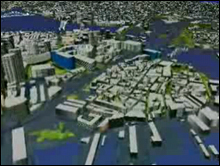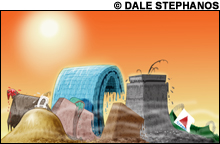
Video: Animation predicts the effectos of global warming on Boston in 2106.
Courtesy of the National Environmental Trust (//www.net.org/)
|
On June 2, 2106, it’s hot. Again. Each of the past five days has topped 95 degrees, but today it’s especially bad, almost as if the sun is literally inching closer to the earth. The mercury is sneaking past the century mark, and as you head out into the soupy, humid swelter, baking beneath the bright sky, it seems stupid, almost suicidal, to be outside.But inside, it’s much worse. Massive drains on the New England power grid have left you without electricity for the better part of two days. And no air conditioner means your third-floor apartment might as well be a convection oven. Only the damp, clammy evenings bring any respite from daytime’s ungodly frizzle fry.
Walking around outdoors is a relief, in a way — and the hordes of people on the sidewalk suggest you’re not the only one who thinks so. At least it’s sunny. Last week was a nightmare — the worst, most violent storm you’ve seen since Hurricane Upsilon two summers ago. The rains were torrential. Strong gales uprooted scores of desiccated, half-bare trees. Flooding was everywhere. Watching your car float listlessly into a gully, you had to laugh. At least you weren’t in it.
The trip downtown is actually sort of pleasant. Despite the oppressive all-enveloping mugginess, it’s a pretty day. The few trees that still line the sidewalk wave gently, and the sky is a supersaturated blue. For the first time in a while, you’re happy. It’s all you can do to keep your eyes off the TVs, visible through the window of a dark and quiet bar, flashing another news report about some poor old guy, dead of heat stroke in an overpopulated and understaffed hospital before his family could make it through the hours-long traffic jam to be there with him.
You think about your own family, and the summers you used to spend down on the Cape, setting up a picnic on that last sliver of beach, poking through the flotsam churned up by the towering waves. No swimming allowed. But it was cooler there, at least. And those lunches Mom used to pack — tuna sandwiches, fresh tomatoes from Dad’s garden — were great. Tuna fish is ridiculously expensive now, of course. Warm waters have pushed tuna to the brink of extinction. And you haven’t seen a tomato in years.
Walking over the old Mass Ave Bridge, you listen to the gorged and odorous Charles lapping lazily just below the balustrade. Strange, walking so close to the river’s surface: it’s almost as though you’re walking across water. Good thing you’re not: it’s disgusting, laced with slicks of sewage and effluvium that leached into the river from overflowing sewers. Above the water, a copious thicket of mosquitoes bobs and swarms over an amorphous mess of snot-green algae. You shudder, then scratch your arm.
Crossing into Back Bay, you choose your route carefully. Avoiding the streets that look more like Venetian canals, you stick to the ones that are merely pocked with gaping puddles. Boylston Street is in pretty good shape, and you follow it toward the Public Garden, whose lagoon, all but dry last week, is now half-filled with days-old rainwater. On the Common, a couple of dogs gambol on the yellow hay-like grass.
Cutting through Quincy Market, which is, surprisingly, still crowded with a goodly number of tourists, you make your way to the waterfront and find a seat on a bench. The warm salt water plashes gently against the side of the Custom House Tower. Looking out at the tiny planes, waiting patiently in the eternal gridlock at New Logan across the harbor, you almost doze off in the torpid warmth, watching the sunlight play on the water. Slowly, the quality of light changes. You look up as a gray thunderhead drifts in and enshrouds the sun, and it starts to pour.

|
We just had a taste
In May 2006, it rained for days and days. Biblical, Noah’s-ark rain. Sustained heavy showers, punctuated by drenching cloudbursts. Rain that gorged rivers and streams, collecting in small lakes on the streets. Rain that submerged parking lots and playgrounds on the North Shore and in Merrimack Valley. These scenes could have just as easily come from New Orleans’s Lower Ninth Ward. The flooding affected 14,000 homes in 40 communities. Total damage could approach $100 million.
Get used to it.
Strange and extreme spells of weather like what we saw in May are “right in line with what the models are predicting,” says Paul Kirshen, a research professor in the Department of Civil and Environmental Engineering at Tufts’s Fletcher School of Law and Diplomacy. Kirshen was the project director of an exhaustive study, Climate’s Long-Term Impacts on Metro Boston (CLIMB), that tried to assess the costs global warming might exact during the next century.